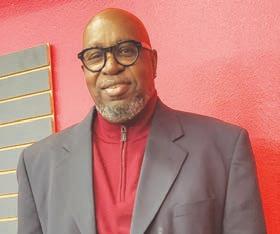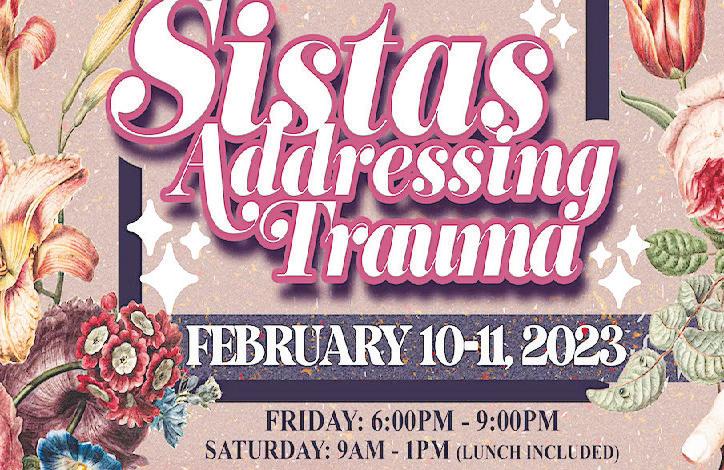
12 minute read
Community (See pages 3 and
The People’s Report: THE BIG ELECTRICAL GRID TEST
Wheels the Texas governor as he is known here in Texas has spent the last two days saying our electrical grid will hold up, straight up confidence game. As U.S. energy infrastructure continues to go largely neglected and city populations keep rising, certain regions of America are under threat of electricity shortages for several years to come. In addition to inadequate energy infrastructure, the rise of renewable power sources and the growing countrywide energy demand are putting pressure on the grid like never before. The Midwest and South-Central U.S, Texas and California appear to be most at risk of electricity shortages according to a recent analysis. These regions fall into the “high risk” and “elevated risk” categories. The shortages are most likely to seen during high peak times. Our first true test is on right now as temps have dropped 30 degrees as I write this, its 19 degrees with forecast low down to 10 degrees not including wind gusts up to 40 mph, its straight up cold. Here in Texas the growth in our population is astounding because we have no state income tax and are pro- business with lower cost of living even though now even here in the DFW areas home prices have soared 40% in the last year and a half. How can the state keep up with the growth and then holla they have no money. Something does not add up mathematically. Again, the peeps don’t history, math or physics.
Advertisement
Several utilities are responding to national and international pressures to shift away from fossil fuels to greener alternatives. However, with solar and wind power being the most common renewable energy sources in the U.S., and the development of battery storage facilities in the early stages, the variable energy supply and demand make it difficult to ensure consistent electricity delivery. In addition, much of the U.S. energy infrastructure requires a major overhaul to make it fit for use as populations grow and different technologies are used to produce energy. Have you ever heard the Preident Biden or our Congressionals of both parties say anything about our electrical infrastructure. But they sure can cheer pump 100’s of billions into Ukrainian Natzi’s and then lie and say Russia is taking over the world and we need to protect democracy, when don’t even have it over here. Talk about misplaced priorities. See good leadership sees and addresses things before they become a crisis. In the meantime, the powers keep pushing for EV’s and we don’t have the infrastructure to bring them online and let alone keep them online. Think about this use critical thinking. If EV’s really do become even 5%, we will have to upsize ALL distribution conductors to
How America’s 1st Black public high school started in a church basement changed history Story by Stephen Nartey

Dunbar High School is the first public high school for AfricanAmerican students in the U.S. It has produced many influential African Americans like Edward Brooke, the first person to be elected to the U.S. Senate; Benjamin O. David Jr, the first African-American Air Force general, and many more.
The school started in the basement of the 15th Street Presbyterian Church with the goal of providing education to African-American children. It was initially named M Street High School before it took on the name Dunbar in 1916, as reported by Saving Places. The school was named after AfricanAmerican poet Paul Laurence Dunbar.
The school launched a concerted campaign to attract the most intelligent African-American students in the districts. The school demanded academic excellence from each of its students amid racial segregation. It encouraged students to dare to dream beyond their reach.
It made students believe that it is possible to become anything they dreamed of irrespective of the color of their skin. Dunbar High School authorities also made sure that students used grammar correctly when speaking English while urging students to strive to acquire a college education.
Journalist Alison Stewart in her book “First Class: The Legacy of Dunbar, America’s First Black Public High School” said the values of Dunbar do not lie in the structure but in the living evidence of those who witnessed and passed through the system. She wrote her book to document the history of Dunbar High School so its story will not be lost in the wake of the school’s original structure being demolished a number of times.
The Dunbar High School was demolished and rebuilt twice — in 1977 and 2013. Alison observed that the school has had its highs and lows and has been representative of the city. She said that though the old structure had been demolished, the newly erected Dunbar High School embodies the spirit and legacy of the school.
In the 1960s and 1970s, Black schools were at the heart of race riots and post-civil actions which were not conducive to teaching and learning. This explains why the new Dunbar High School has a towering look that welcomes everyone and radiates a community where academic excellence is the hallmark.
withstand the added electrical load. See the problems of growth are not fixable by current technological advances. ‘Power density’ for example, when you’re constrained by the laws of physics, you stay jacked up. I have not even written about different extreme weather patterns.
A lots of this is our fault when we vote we don’t demand accountability. See there is an agenda that we can’t see and its in the atmosphere.
The Progressive Watchman -Leon Prather




New Year, New Beginnings! by Kimberley Blair Pleasant

A New Year should bring new beginnings, new attitudes, and new memories. But it is important for us to not forget the past. Many things that have happened in 2022, we should take heed to and not forget and repeat mistakes and hopefully we can learn from. Other things that have happened this year those happy memories that have been created in our lives with family and friends we should hold dear to our hearts and keep them sacred and safe, especially in times of sadness.
A New Year brings forth many things most importantly it should bring kindness, love, and respect for all! No matter what your political party, sexual orientation, or religion should not stop you from being kind to others! Be in your adult self and understand that our differences are what makes the world go round! Our differences make us who we are as a people. Let's stop and think about what this New Year should bring. It should bring HOPE for a better tomorrow, HAPPININESS for the things that we have been Blessed with and will be Blessed with, and most of all HEALING, whether it is physically, mentally, or spiritually.
Looking back on the past can be good or bad depending on your perspective. BUT looking forward to the future helps us see a brighter tomorrow and a hope of what is meant for us as a people. Happy New Year and may all you days be Bright!
Holley v. Adams: Part I with Miles D. Peterson

In the world of family law, the term “best interests of the child” is often thrown around as the standard for cases involving children. But have you ever considered where this standard comes from and what factors are used to determine it? This week I’m going to tell you about the case that every family law attorney knows and lives by, Holley v. Adams.
In the case David Adams (Father) is seeking to terminate the parental rights of his ex-wife, Nanci Adams Holley (Mother). The two were married in 1965 and had their only child. Three years later they split up, with divorce being filed soon after. The divorce itself was relatively smooth. Mother willingly gave possession of the child to Father during the proceedings and did not have any issue with Father being awarded custody in the final decree of divorce.
Shortly afterwards, Father remarried while Mother was arrested and jailed for traffic offenses. Mother also soon found herself committed to a state hospital for treatment of mental illness. Eventually, she left Father and their son in Austin, Texas and moved to Seattle, Washington where she remarried.
Mother returned to see her son three times in three years and sent him about $100 over a period of five years. Father filed suit for the termination of Mother’s parental rights on the grounds that she had “failed to support the child in accordance with her ability…and had emotionally and actually abandoned the child; and that termination would be in the best interest of the child.” The Trial Court sided with Father and ordered that Mother’s parental rights be terminated. However, Mother appealed and thus the Holley factors were born.
The factors that came from the Supreme Court of Texas are used to this day to determine the best interests of a child. They are:
1. The desires of the child;
4. The parental abilities of the individuals seeking custody;
5. The programs available to assist these individuals to promote the best interest of the child;
6. The plans for the child by these individuals or by the agency seeking custody;
7.the stability of the home or proposed placement;
8. The acts or omissions of the parent which may indicate that the existing parent-child relationship is not a proper one; and
It is important to remember that the list stated in the case are not the end all be all of factors that courts will consider in determining best interests, but it is where every analysis will start. Next week, we will discuss how these factors were applied to Nanci Adams Holley’s appeal.
SIAC SERVES FOR THE HOLIDAYS

ATLANTA, Ga. (December 28, 2022) -
During the holiday season, the Southern Intercollegiate Athletic Conference (SIAC) partnered with 100 Black Men of America and First Tee of Metro Atlanta to provide over 500 pairs of shoes to community organizations in need.
Commissioner Holloman has headed this effort intending to continue the league’s give-back initiative to surrounding communities.
“The Southern Intercollegiate Athletic Conference is proud to partner with the 100 Black of America for this significant community service project aimed at providing resources for disadvantaged groups in our institutional footprint,” said SIAC Commissioner Anthony Holloman. “The SIAC and its member institutions are committed to providing the tools needed to inspire and motivate the next generation of leaders. We believe this partnership with the 100 Black Men of America will allow for a greater impact among youth who benefit from the mentorship of the 100.”
100 Black Men of America is recognized as the nation’s top African American led mentoring organization. It provides unique programs that address local communities’ specific needs by providing the tools to empower their students.
The league, in conjunction with our local member institutions, donated a combination of clothes and shoes to the following 100 Black Men of America chapters:
• South Metro Atlanta (Clark Atlanta
University and Morehouse College) • Birmingham (Miles College) • Albany (Albany State University) • Savannah (Savannah State
University) • Montgomery (Tuskegee University) • Louisville (Kentucky State
University) • Atlanta (Clark Atlanta University and Morehouse College) • Jacksonville (Edward Waters
University) • Macon (Fort Valley State
University) • Memphis (LeMoyne-Owen
College) • Columbia (Benedict College and
Allen University) In addition, the league partnered with Clark Atlanta University and Morehouse College to donate golf shoes to the First Tee of Metro Atlanta.
First Tee began in 1997 as a partnership among the LPGA, the Masters Tournament, the PGA of America, the PGA TOUR, and the USGA to make golf affordable and accessible for all kids.
About Southern Intercollegiate Athletic Conference (SIAC) The SIAC is an NCAA athletic conference consisting primarily of historically black colleges and universities (“HBCUs”) headquartered in downtown Atlanta, Georgia. The SIAC includes 15 member institutions (Albany State University, Allen University, Benedict College, Central State University, Clark Atlanta University, Edward Waters University, Fort Valley State University, Kentucky State University, Lane College, LeMoyne-Owen College, Miles College, Morehouse College, Savannah State University, Spring Hill College, and Tuskegee University), which are located within a contiguous seven-state footprint (Alabama, Florida, Georgia, Kentucky, Ohio, South Carolina, and Tennessee). The SIAC sponsors seven men's and six women's sports and is a proud member of the NCAA Division II. For more information, visit www.thesiac.com.
Best Regards, -Tyler A. Williams
SOUTHERN INTERCOLLEGIATE ATHLETIC CONFERENCE (SIAC)
ASSOCIATE COMMISSIONER OF COMMUNICATIONS & SENIOR WOMAN ADMINISTRATOR (SWA)
235 Peachtree St. NE. | Suite 434
Atlanta, GA 30303
Office: 404-880-4669 | Cell: 470-9524710
E-Mail: williams@thesiac.com
Website: www.TheSIAC.com
FACEBOOK.COM/THESIAC
TWITTER.COM/THESIAC
INSTAGRAM.COM/THESIAC

Honey B's Honesty, Integrity & Experience 20yrs Day Care And Meal Plans Available Pet Obstacle Course • Weave Poles • Dogwalk • Standard jumps • Tunnel • Tire jump • Teeterboard To schedule your appointments give us a call @ (972)9322237






Time to show your heart some love
February is Heart Month. And heart disease is the leading cause of death in our community and across the country. So, let’s do something about it, together. Every week during Heart Month we’ll be sharing heart healthy tips, from early warning signs to recipes and exercise ideas. Caring for the heart health of our friends and neighbors. That’s community and why so many people Trust Methodist.
Sign up for Heart Month emails with tips, recipes, exercise ideas, info on events, and more at:
MethodistHealthSystem.org/HeartMonth
Texas law prohibits hospitals from practicing medicine. The physicians on the Methodist Health System medical sta are independent practitioners who are not employees or agents of Methodist Health System. Methodist Health System compiles with applicable federal civil rights laws and does not discriminate on the basis of race, color, national origin, age, disability, or sex.




